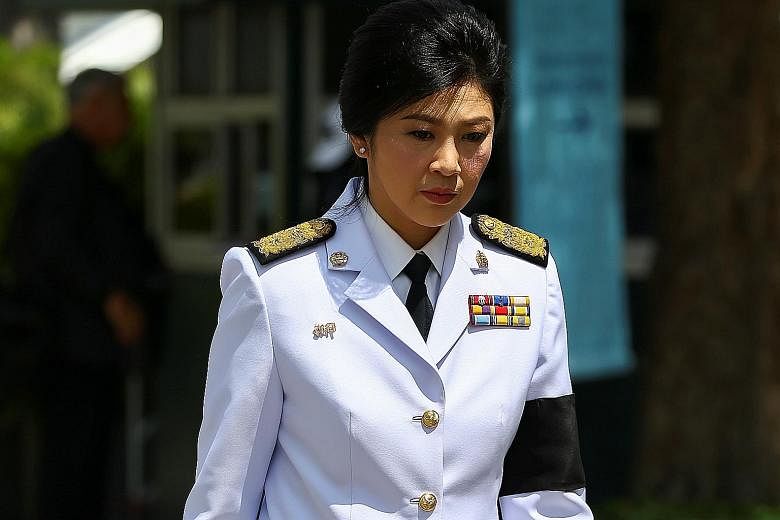Ousted Thai prime minister Yingluck Shinawatra, who is fighting a criminal negligence case in court, has been slapped with a 35.7 billion baht (S$1.42 billion) fine in connection with a rice subsidy scheme run by her government.
The military government has issued an administrative order to claw back money spent by her administration, which bought rice from farmers for some 50 per cent above market price. She has 30 days to pay up, or risk having her assets seized.
Yingluck has vowed to contest the order, which she said she received on Wednesday.
"It is illegitimate and unfair," she told reporters yesterday before a hearing for her court case.
"I will exercise my rights through all legal channels to fight this."
Yingluck, who declared 541 million baht in net assets when she assumed office in 2011, is currently on trial for criminal negligence over the same rice scheme. Critics say it was riddled with corruption and left government warehouses overflowing with stockpiled padi.
She faces up to 10 years in jail if found guilty.
The 49-year-old former business executive is the younger sister of former prime minister Thaksin Shinawatra, who was toppled by a coup in 2006 but continues to wield significant political influence through his allies and relatives.
Thaksin drew much support from the rural masses in populous north- eastern and northern Thailand. The billionaire has been blamed by the kingdom's elite for creating what are now deep political divisions and currently lives overseas to avoid a graft-related jail sentence.
Yingluck's Puea Thai party swept the 2011 elections but she was booted from office by a constitutional court ruling in 2014, shortly before the remnants of her caretaker government were ousted by a military coup. Last year, she was retroactively impeached by a military-appointed legislature, which banned her from politics for five years.
The hearing for her criminal negligence case is expected to last until June next year.
Government spokesman Sansern Kaewkamnerd told The Straits Times yesterday that the order was made "in the country's interest".
"It is for everyone's good," he said.
While Yingluck's critics say the action would deter politicians from adopting populist measures, she has argued that the merits of policies cannot be judged by profit or loss. The rice pledging scheme was a flagship policy of her short-lived administration.
Since taking power in 2014, the junta has ruled through an interim Constitution which grants it absolute power. Coup-maker and Prime Minister Prayut Chan-o-cha has invoked this power frequently to fast-track policy decisions.
Earlier this week, he removed Bangkok governor Sukhumbhand Paribatra from his post even though a probe over financial irregularities in the city hall has yet to be concluded. A new governor was appointed in his place.
Thailand is expected to hold fresh elections late next year after a draft Constitution received public approval in a referendum conducted in August. The new Constitution gives the junta oversight in the future elected government.

